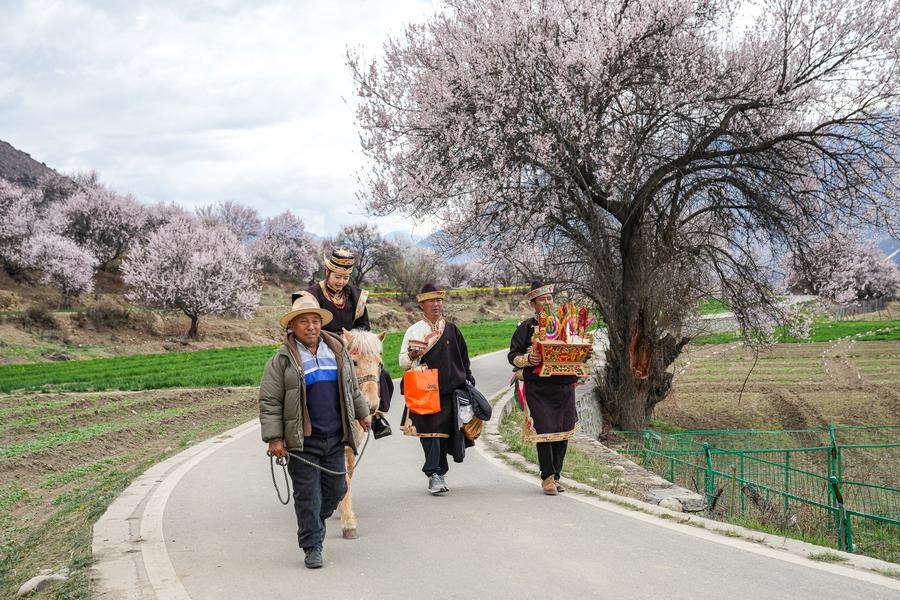Delivery network provides holiday lifeline spanning almost entire country


For Shao Fang, a migrant worker from a rural part of Henan province, China's extensive delivery network has been essential in allowing her to keep in touch with her family during the past three years.
Working as a maid in cities such as Beijing and in Suzhou, Jiangsu province, she has been unable to return home often to see her family, especially her 8-year-old son, because of the epidemic.
However, the nation's delivery network, which has expanded rapidly over the past decade, has enabled Shao to send gifts to her son at any time despite the challenges caused by sporadic outbreaks of COVID-19 and changing prevention and control measures.
"Even when the epidemic was serious in the region and most people were sick, my boy could receive parcels from me, a bit slower than usual but they'd always get through," she said.
When the epidemic was serious, Shao sent some face masks back home, and she thought about sending medicine home in December when COVID-19 outbreaks were peaking across the country.
"My family told me they could easily get herbal medicines from nearby clinics," she said.
The parcel delivery network usually slows during Spring Festival because many couriers take time off and return home to celebrate China's most important holiday.
With this year's Spring Festival, which fell on Jan 22, being the first in three years to have no restrictions on movement but with the lingering threat of COVID-19 still in the air, a lot of attention fell on the delivery network as to whether it would be able to facilitate deliveries of medicine in a timely manner, especially in rural areas.
To ensure the operation of the delivery network remained smooth over the holiday period, the sector's regulator, the State Post Bureau of China, urged operators to make the appropriate adjustments and plans so that services remained normal.
Greater attention was paid in some key areas to improve parcel delivery capacity in rural areas, Han Jinghua, an official from the Ministry of Transport, said at a news conference on Jan 30.
"Major parcel delivery companies were urged to improve their transport plans for emergencies during the holiday, and to improve their allocation of resources to rural areas to ensure last-mile delivery," he said.
More than 700 million parcels were collected and delivered across China during the weeklong Spring Festival holiday from Jan 21 to 27, according to the bureau.
Among them, more than 3 million parcels contained medical supplies, which were received in a timely fashion, the bureau said.
About 100 million parcels are collected and delivered in rural areas of China every day, one-third of the total volume of packages handled across the country, according to figures from the State Post Bureau.
About 90 percent of villages in China have access to the parcel delivery network, enabling rural residents to buy commodities from urban areas and sell their local products further afield, according to the bureau.
In December 2021, Zhang Furong, from a village of Meishan in Sichuan province, sent a package of tangerines that became the country's 100 billionth parcel of the year.
In December last year, Cai Zexin sent a parcel of sweet pomelos from a village in Zhangzhou in Fujian province, also becoming the country's 100 billionth parcel for the year.
The rural coincidence in some ways demonstrates the rapid development of the parcel delivery network in rural areas. It also shows that the sector has played an important role in boosting rural vitalization.
Wang Lei from ZTO Express, a major parcel delivery company in China, who oversees operations in the city of Yongji in Shanxi province, said his parcel delivery stations were busy during the Spring Festival holiday, during which about 1,500 parcels were delivered to 150 villages across Yongji every day.
Since Jan 24, the third day of the Lunar New Year, about 400 parcels containing grapes were collected at parcel delivery stations in Yongji every day, weighing about 750 kg to 1,000 kg, he said.
"It means that nearly a ton of grapes from Yongji were sold to other parts of China every day, and delivered via the fast delivery network. The grapes would have appeared on the dinner tables of people across the country during the holiday," he said.
Yongji is one of the main grape producing areas in North China.
The parcel delivery network has expanded to all 195 administrative villages in Yongji as of July.
"As the network expands and becomes more stable, it has become more convenient to set up delivery stations in the countryside. For us, the operating costs have reduced, and for villagers, the delivery speed has increased," Wang said, adding that local agricultural produce has been sent across China via the delivery stations.
"The incomes of villagers have increased, and the stations have become more stable," he added.
"Before the parcel station, I had to take grapes to the nearby township to be delivered," said Miao Shuisheng, a grape grower from a village in Yongji, who added that the trip took about two hours.
"Now we have a delivery station, which makes it more convenient, and I can even send grapes during Spring Festival. It makes it easier for me to earn more money," he said.
The trend has been seen nationwide. During the holiday, the demand for agricultural products increased, according to the bureau.
To assist the network's operation during the holiday, more than a million couriers stayed on duty, the bureau said.
JD Express, another major parcel delivery company, invested 500 million yuan ($74 million) to reward couriers who stayed on duty during the holiday, according to the company.
The company also had more flexible work schedules to allow couriers to take breaks.
- China renews several alerts for gales, sandstorms, blizzards
- China, Vietnam to conduct joint patrol in Beibu Gulf
- Tradition, tea, and tomorrow: Xi's stories with Vietnam
- Governor of Shanxi under probe
- Beijing handles over 800 fallen trees due to strong winds
- Beijing airport cancels over 400 flights due to strong winds



































